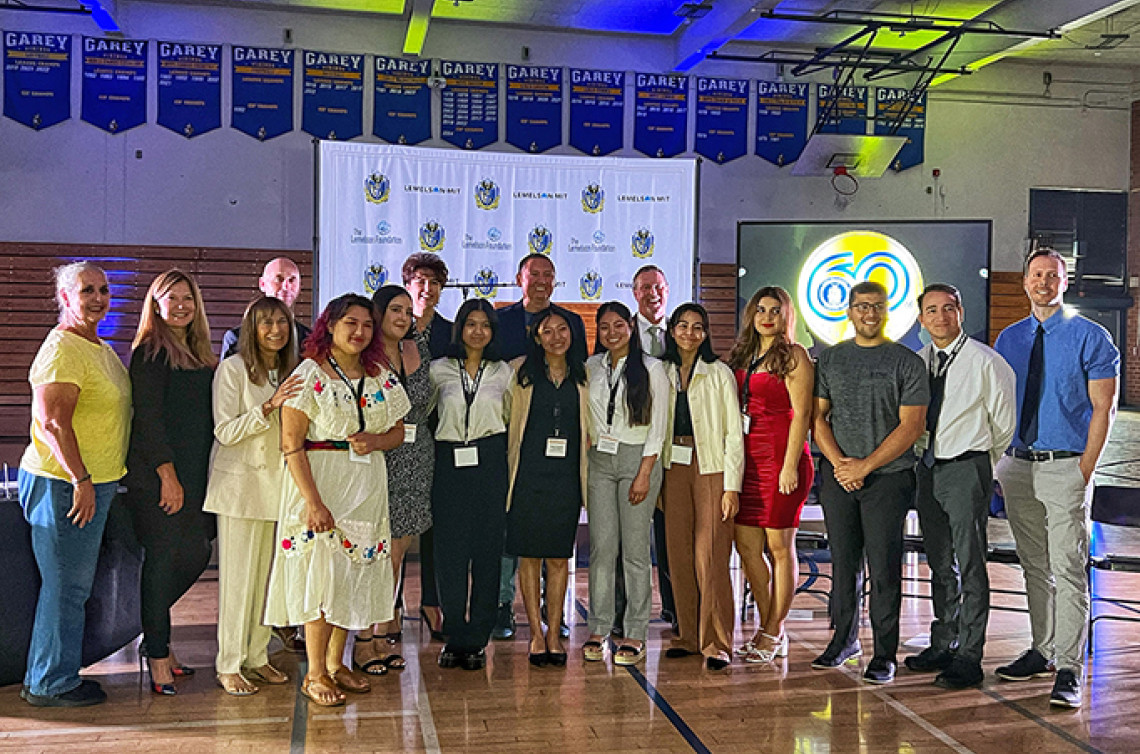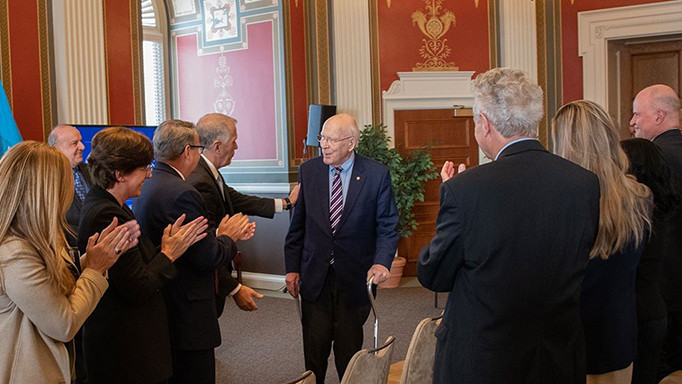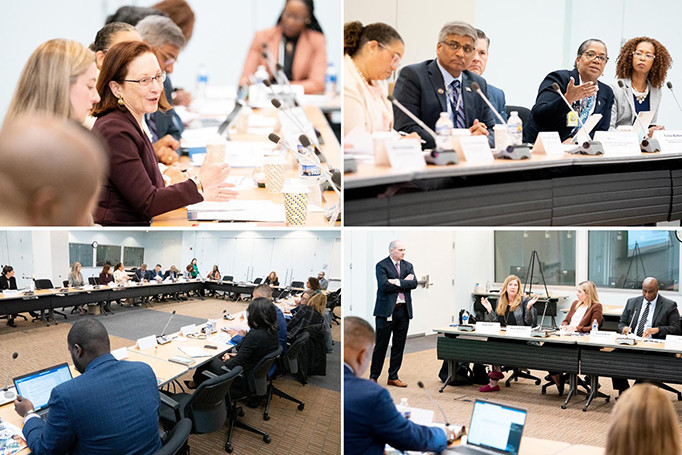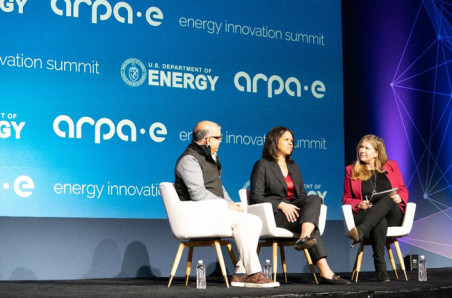
On September 19, Director Vidal joined a team of student inventors at Garey High School in Pomona, California to congratulate them on inventing and patenting a device allowing patients with diabetes to self-monitor foot health.
The Unleashing American Innovators Act: Promoting inclusive innovation under the new law
Since I took the helm of the USPTO in April of 2022, the USPTO has been working feverishly to unleash America's potential. We immediately expanded our pro bono efforts, focused on outreach and impact, and are working on ways to better support those new to the innovation ecosystem.
We are guided by the vision that by quadrupling the number of U.S. inventors, we can expand our economy, and GDP, by $1 trillion. We can create more and better jobs in more communities and give every American the opportunity, tools, and support to pursue the American dream. With the support of Congress and President Biden, and the Senator Patrick Leahy-led Unleashing American Innovators Act of 2022, signed into law as part of the Consolidated Appropriations Act, 2023 on December 29, now is the moment to make lasting, sustainable change.

On November 29, the USPTO joined the U.S. Copyright Office to honor Senator Leahy's 48 years in the U.S. Senate and his considerable contributions to the nation's intellectual property (IP) system.
First, we must reach people where they are to bring them into the innovation ecosystem. The USPTO has been focused on outreach and impact, including the impact of the USPTO throughout the country. After hosting a two-day summit at our Rocky Mountain Regional Office in Denver, Colorado this past summer, we have been working on a plan to increase our geographic reach, and have been awaiting passage of the Unleashing American Innovators Act of 2022. Now that the bill is law, we are positioned to move forward quickly.
The bill supports USPTO's expanded outreach efforts by requiring the USPTO to establish, within three years, a Southeast Regional Office, serving the states of Virginia, North Carolina, South Carolina, Georgia, Florida, Tennessee, Alabama, Mississippi, Louisiana, and Arkansas. The bill also requires the USPTO to report out within two years on whether additional offices are necessary to further increase participation in the patent system by individuals who have historically been underrepresented in patent filings.
In addition to satellite offices, the bill calls for the USPTO to establish community outreach offices within five years, including one in the New England region and in areas of the country where minority business owners are not as prevalent to help increase the number of underrepresented inventors and entrepreneurs in those areas.
Second, we must reduce the innovation ecosystem's barriers to entry. As a fee-funded agency, we continually need to assess and adjust fees to ensure we are recovering costs to produce the most robust and reliable IP protection possible. This work is critical to the U.S. economy in securing investment, innovation, and jobs in the U.S., and to advance an IP system that is accessible to all. Although small and micro entity fees help keep fees lower for those who are under-resourced, more needs to be done. Accordingly, the bill increased small entity discounts from 50 percent to 60 percent and micro entity discounts from 75 percent to 80 percent (view the updated USPTO fee schedule on our website).
While fees can pose a barrier to new entrants to our innovation economy, the fees charged by the USPTO are often dwarfed by the price of legal counsel. Recognizing that some applicants will need to proceed pro se (without legal counsel), the USPTO launched a Patent Pro Se Assistance Program to provide those applicants additional assistance on how to obtain a patent.
We have also been working since my first day to expand the USPTO's Patent Pro Bono Program for independent inventors and small businesses. When we reach out and meet people where they are with pro bono legal services, we serve a broader group of constituents. Our data shows while the number of women inventors named on patents remains around 12-13%, the percentage of pro bono participants benefitting from our services is 41% women, 30% African American or black, 14% Hispanic American, 5.6% Asian American or Native Pacific Islander, and 1.5% Native American. In other words, pro bono counsel is providing critical assistance to underrepresented inventors and serving as the bridge to our innovation economy.
The bill supports our efforts to further build our pro bono programs, calling for us to complete a study within the next year on our pro bono programs and work with our Pro Bono Advisory Council, the regional program operators, and IP law associations across the country to implement meaningful changes that will help us expand efforts to provide free assistance to inventors and entrepreneurs. It also calls for the expansion of income eligibility to allow more innovators to benefit from these programs, putting the threshold at 400 percent of the federal poverty line as an individual's gross household income. We are thrilled to continue this critical work.
Third, we must provide those new to the innovation ecosystem the education and support they need to be successful.
The USPTO offers extensive free services and courses to educate the public, including those new to the IP ecosystem, on ways in which IP protection can help them bring their ideas to reality and build successful businesses. A few examples of these resources:
- Our 8-part Path to a Patent series, next running from January 12 - March 16, covers everything from IP basics, to patent searching, to what you'll need to draft and submit your patent application. Similarly, our 8-part Trademark Basics Boot Camp series provides a comprehensive overview of trademarks and the federal trademark registration process, including walking participants through the application filing process and concluding with a live question-and-answer period with a USPTO trademark expert. The next series kicks off January 10 and runs through February 28.
- Our Stakeholder Application Readiness Training (StART) provides training tailored to educate pro se applicants about the patent filing process and provides resources to submit a nonprovisional patent application.
- Our law school clinic program, which now includes over 60 participating clinics and provides legal services free to the public, including to inventors, entrepreneurs, and small businesses.
- Throughout the year, our Office of Innovation Outreach provides free events to inspire, educate, and empower underserved and under-resourced communities of innovators. The events feature successful independent inventors, entrepreneurs, and small business owners who share their personal stories of how they are using their patents and/or registered trademarks to reach their full potential, as well as subject matter experts who share information about funding/financial literacy, technical assistance, and mentoring/network programs. Working with partners from other federal agencies, organizations, and universities, the USPTO connects the public to valuable and timely information and resources at these events year-round.
- Our resources for kids, students, educators, and parents connect the K-12 community with engaging, fun activities (including inventor trading cards!) that bring out the innovator in all students and teach them about the importance of safeguarding ideas and businesses through IP protection. Lots more to come on that in 2023, so stay tuned!
- Our inventor and entrepreneur resources provide inventors and entrepreneurs information to assist them at any stage of protecting their inventions and/or brand (e.g., education about the different types of IP, how to apply for a patent or trademark registration, assistance available after an application has been filed, etc.).
- Working across government and streamlining resources, our Council for Inclusive Innovation (CI²), of which I serve as Vice Chair and Secretary of Commerce Gina Raimondo as Chair, the National Advisory Council for Innovation and Entrepreneurship (NACIE) led by our sister agency the Economic Development Administration (EDA), and other collaboration opportunities with the military and veterans, the Minority Business Development Agency, Tribal Nations and communities, and more, work to eliminate barriers to the innovation system and meet people where they are with the resources they need to increase American innovation and entrepreneurship. Additionally, our recently-launched Women's Entrepreneurship (WE) initiative serves to empower more women leaders and advance the conversation around challenges and opportunities for women-owned businesses.

On November 30, Director Vidal and the Co-Vice Chairs of the Council for Inclusive Innovation (CI²) met at USPTO headquarters for an ideation workshop to develop a whole-of-government approach to expanding innovation. (Photos by Jay Premack/USPTO)
I have also spoken with individual inventors and small companies across the country to learn about their pain points. As a result, the USPTO is working on an expedited filing program to provide under-resourced first-time filers with expedited examination at no additional charge. We plan to announce the program later this month. As part of that program, applicants will be required to take certain key training to help ensure their success.
We are grateful that the bill provides us with the flexibility to explore more ways to assist first-time filers, including additional pilot programs to help them navigate the application process. Notably, the bill bolsters our work to support first-time applicants by establishing a pilot pre-prosecution assessment program, providing assistance to first-time prospective patent applicants in assessing the strengths and weaknesses of their potential patent applications.
I want to close by thanking and congratulating Senator Patrick Leahy and all those who worked hard to push the bill across the finish line. The bill complements our work to support small inventors, startups and those traditionally underrepresented in the innovation ecosystem. With the lower fees, additional outreach and support, and the expanded ability to obtain pro bono counsel, we are positioned to make meaningful progress in 2023 by measurably lowering the barriers for those entering the innovation ecosystem. As Secretary of Commerce Gina Raimondo remarked, “[a]s we successfully implement the programs” outlined in the bill, “the Biden Administration will continue showing that an economy that invests in the American people is an economy that will create shared prosperity for all.”
Engage with the Director and join the conversation on our social media channels.






